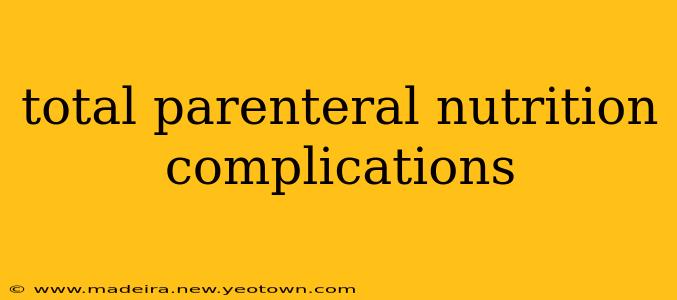Total Parenteral Nutrition (TPN) is a lifeline for individuals unable to receive adequate nutrition through the digestive tract. It delivers essential nutrients directly into the bloodstream, bypassing the gut entirely. While a crucial intervention, TPN is not without risks. Navigating the complexities of TPN requires a thorough understanding of its potential complications, which can range from minor inconveniences to life-threatening conditions. Let's delve into the potential pitfalls and how they can be managed.
What are the Common Complications of TPN?
TPN, while offering life-sustaining nutrition, carries a significant risk of complications. These complications can affect various systems within the body, highlighting the need for meticulous monitoring and management. The severity and frequency of these complications vary based on factors such as the duration of TPN therapy, the patient's underlying health conditions, and the precision of the nutritional formula.
Metabolic Complications
Hyperglycemia: One of the most prevalent complications is hyperglycemia, or high blood sugar. The infusion of large amounts of glucose can overwhelm the body's ability to process it efficiently, leading to elevated blood sugar levels. This is particularly relevant for patients with pre-existing diabetes or impaired glucose tolerance. Careful monitoring of blood glucose levels and adjustments to the TPN formula, including insulin administration, are crucial for managing this complication.
Hypoglycemia: Conversely, hypoglycemia (low blood sugar) can occur if the TPN infusion is interrupted or the body unexpectedly utilizes glucose more rapidly than anticipated. This can lead to symptoms such as dizziness, confusion, and even seizures. Regular blood glucose monitoring and careful scheduling of infusions are vital in preventing hypoglycemia.
Infectious Complications
Catheter-Related Bloodstream Infections (CRBSIs): The central venous catheter used to deliver TPN is a major entry point for infections. CRBSIs are a significant concern, potentially leading to sepsis (a life-threatening condition caused by the body's overwhelming response to an infection). Meticulous adherence to sterile techniques during catheter insertion and maintenance is paramount in minimizing this risk.
Liver Complications
Fatty Liver Disease: Long-term TPN therapy is associated with the development of fatty liver disease. This occurs due to the altered metabolism of fats and other nutrients in the absence of gut activity. Regular liver function tests are necessary to monitor for this complication.
Gastrointestinal Complications
Gut Atrophy: The lack of stimulation to the gastrointestinal tract from oral intake can lead to a wasting away of the gut lining, resulting in gut atrophy. This can cause difficulties in transitioning back to oral feeding once TPN is no longer necessary. Strategies to stimulate gut function may be utilized alongside TPN to mitigate this.
Other Complications
Electrolyte Imbalances: TPN can disrupt electrolyte balances, causing conditions such as hypokalemia (low potassium) or hypophosphatemia (low phosphate). Regular blood tests are essential to detect and correct any imbalances.
Fluid Overload: The infusion of large volumes of fluids can lead to fluid overload, putting stress on the cardiovascular system. Careful monitoring of fluid balance is necessary.
How are TPN Complications Managed?
Managing TPN complications involves a multi-faceted approach that focuses on prevention, early detection, and prompt intervention. This includes:
- Meticulous sterile technique: Strict adherence to asepsis during catheter insertion, maintenance, and dressing changes is crucial in preventing infections.
- Regular monitoring: Frequent monitoring of blood glucose, electrolytes, and liver function is essential to detect any abnormalities promptly.
- Nutritional adjustments: The TPN formula can be adjusted based on individual needs and responses.
- Supportive care: This may involve medications to manage hyperglycemia or electrolyte imbalances, as well as appropriate interventions for infections.
- Close collaboration: A multidisciplinary team involving physicians, nurses, dietitians, and pharmacists works collaboratively to provide comprehensive care.
TPN is a powerful tool in nutritional support, but its use necessitates a keen awareness of potential complications. Proactive management through meticulous attention to detail and close monitoring minimizes risks and ensures the best possible outcome for patients.

